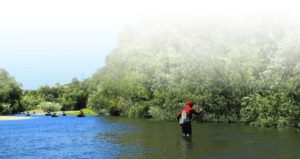 Russian Riverkeeper (RRK) and our state association, California Coastkeeper Alliance, recently filed a challenge to the Sonoma County Well Ordinance update. While the new ordinance started the conversation around what is needed, the final amendment is too vague and has not analyzed whether it will protect fish and other resources as claimed. The stakes are too high to not take the time to get this policy right.
Russian Riverkeeper (RRK) and our state association, California Coastkeeper Alliance, recently filed a challenge to the Sonoma County Well Ordinance update. While the new ordinance started the conversation around what is needed, the final amendment is too vague and has not analyzed whether it will protect fish and other resources as claimed. The stakes are too high to not take the time to get this policy right.
The Well Ordinance update was in response to a prior lawsuit against the County for failing to protect endangered fish and other resources from county-permitted wells. Existing wells are known to pump streams so low, and oftentimes even dry, that fish and other species become trapped and die. Beyond fish impacts, many families and small farms have had their wells go dry and are experiencing reduced water quality due to the recent drought and increased groundwater use. It is clear we have an issue now—unrestrained groundwater pumping cannot continue as it has.
Climate change will continue to exasperate these impacts with more extreme dry periods, and it is making groundwater pumping by wells a bigger problem for people, fish, and other resources. Taxpayers have spent tens of millions of dollars to help save our salmon and restore our watershed, but continued over-pumping by wells puts all those investments at risk. Yet, the updated well ordinance allows for a continued increase in groundwater extraction. We need only look at the Central Valley, where more than a million people lack access to clean water, to see our future without adequate regulation. Groundwater is limited and like our family checkbooks if we keep taking too much out there will be problems. We asked the County during the hearings to commit to an adaptive management process and they did not.
This left us with a few options:
1) Ignore the health of our salmon and neighbors’ wells
or
2) Challenge the ordinance
We have chosen the latter.
Our goal is for the County to finish the job they started to ensure that people, fish, and other resources are protected from unregulated groundwater pumping. The County did not analyze, and thus, does not know, whether the mitigations they proposed would really protect fish or existing wells from over-extraction. Combined with limited metering requirements and continued expansion of use, the amount of uncertainty this ordinance is based on is not protective of our groundwaters. The time to reduce that uncertainty and manage our groundwaters wisely is now.
With so much at risk, it is vital that necessary analysis be completed so that the ordinance is based on what is actually protective of fish, other resources, and well users. It is also important that the ordinance be continually updated with the latest use information. There are many ways to mitigate impacts from well pumping, but without good information, we don’t know what tools to use. To ensure this policy is done right, more analysis is needed to help enable the County to set a safe limit on total groundwater pumping.
The benefits of gathering more data and performing additional analysis will help our community survive future droughts without wells running dry. If the County takes the time to get this policy right, we can protect the endangered salmon that we’ve put so much effort into saving, while still supporting other local needs. If we help save the salmon and other resources by keeping water in our streams, it is certain that we won’t run out of water. That is the win-win we hope to achieve by challenging the County’s most recent well ordinance update.
